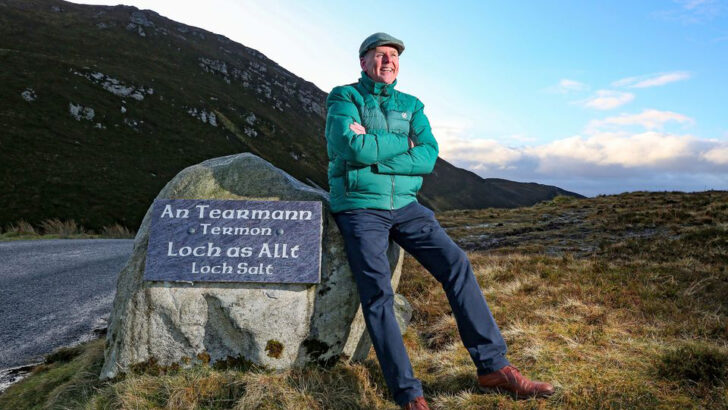J. Anthony Gaughan
Beidh Tú Alright: An Irish Language Journey,
by Joe McHugh
(Red Stripe Press / Orpen Press, €19.99 / £17.99)
This book is an illuminating and eventful account of a Donegal man’s journey through often conflicting aspects of Irish life, culture and language. Everyone , but especially those who are doubtful on the use of the Irish language, will find it most interesting.
The background of the author is an important aspect of the book. Joe McHugh was born at Carrigart, Co. Donegal, on July 16 1971. He attended Umlagh National School, Loreto Community School, Milford, and St Patrick’s College, Maynooth.
After graduating from Maynooth he secured an appointment at the Loreto Secondary School in Letterkenny, where he taught from 1993 to 1995. Then after a year teaching in Dubai he returned to Ireland and was active in youth ministry in the Letterkenny area.
He was elected to Donegal County Council in 1999 and so began his life-long career in politics. He was subsequently elected to Seanad Éireann in the interests of Fine Gael. Joe topped the poll in the Donegal North-East constituency in the general election in 2007.
Apart from other appointments he was given responsibility for North-South Co-Operation. He was re-elected to the Dáil in 2011 and was later appointed Minister of State at the Department of Communications, Energy and Natural Resources and at the Department of Arts, Heritage and the Gaeltacht. Joe retained his seat in the 2016 general election and was appointed Minister for Education and Skills in 2018. He retired from politics in 2024.
Controversy
Joe attracted controversy. In January 2011 he proposed that a monument, funded by the Irish government, be erected in Donegal to commemorate the founding of the Ulster Volunteer Force.
This he did, notwithstanding that Eddie Fullerton, a member of Donegal County Council and a member of the provisional IRA, had been assassinated by loyalists in 1991 and he and the other Fine Gael Councillors did not partake in events to remember Fullerton and objected to a monument being erected to him in his native Buncrana.
In 2016 Joe was again the centre of controversy. He resided at the edge of the Donegal Gaeltacht and his distribution of the grants to the various Gaeltachts was, seemingly, unduly favourable to his native Donegal. It resulted in his having to appear before the Public Accounts Committee.
In 2022 Joe vindicated his claim to be a person of principle when he resigned from his Party, refused to support the government and continued to serve in the Dáil as an Independent. The issue on which he resigned concerned the assistance to be provided to those in his constituency who had to substantially repair their homes because of the extensive use of a defective block in their erection.
The controversy with which Joe is mostly associated occurred when in 2014 he was appointed to the Ministry which among other responsibilities involved promoting the Irish language. At that time, he was one of those people who mark in the Census form that they ‘have Irish’.
They learn Irish in the primary and secondary schools, sometimes in schools where the teaching is through the medium of Irish, as in my case. At the conclusion of their education they are competent in Irish. However, owing to their non-use of it, their knowledge of it withers away.
At his first interview with the media as the minister responsible for the Gaeltacht and the Irish language, Joe had to admit that he was not able to converse in Irish. This prompted an outcry from the Irish-speaking community. There were protesters at Government Buildings chanting Aire gan teanga, Aire gan clue (a minister without a language is a minister without a clue).
Joe there and then set out to acquire a comprehensive knowledge of Irish, the culture which underpins it and a fluency in speaking it. This book is a very revealing and honest account of that odyssey into the mysteries of Irish culture which continues to the present day.
The book is meticulously researched, well-written and beautifully laid-out. For anyone who wishes to brush up on their Irish one could not recommend a more useful vade mecum.


 Joe McHugh at home in Donegal with the Irish language
Joe McHugh at home in Donegal with the Irish language 